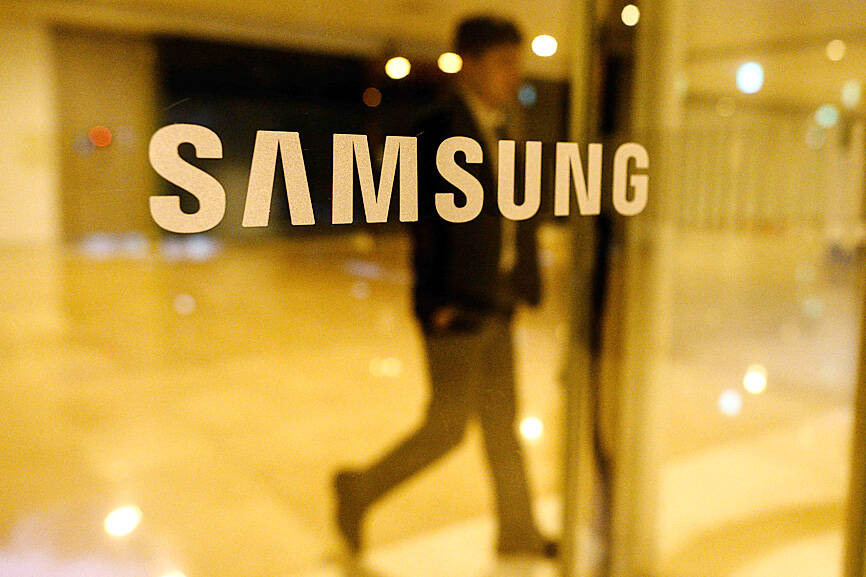Samsung Electronics Co yesterday announced a record first quarter sales forecast and said it saw a better-than-expected performance for profits, even as analysts warned US tariffs could soon impact the South Korean tech giant.
In a regulatory filing, Samsung predicted its January to last month operating profits to rise to 6.6 trillion won (US$4.46 billion), down 0.15 percent from a year earlier but up about two percent on the previous quarter.
This was almost 34 percent higher than the average estimate, said South Korea’s Yonhap news agency, which cited its own financial data firm.

Photo: AFP
Samsung is a chip powerhouse, and one of the world’s largest makers of mobile phones.
The company said sales were also seen increasing to 79 trillion won, a near 10 percent jump from a year earlier, marking the highest first-quarter figure on record and the second-highest quarterly revenue ever.
The company did not disclose its net income or the detailed earnings of its business divisions.
However, experts say US President Donald Trump’s reciprocal tariffs could heavily impact Samsung as more than half of its smartphones are made in Vietnam, which now faces a 46 percent US duty.
“Samsung’s consensus-beating first-quarter operating profit implies its popular product offerings, such as Galaxy smartphones, could weather a tough business environment, when combined with strong cost control capabilities,” Bloomberg Intelligence analysts said. “Yet the pace of profit growth might slow in the second quarter given most of its smartphones are made in Vietnam, which subjects them to US import tariffs.”
The high figures forecast were partly down to record sales of the new Galaxy S25 series phone, which was released in February, experts said.
Samsung also benefited from strong demand for server DRAM — mostly used in data centers — which offset slowing prices for more conventional high-end chips, TrendForce Corp (集邦科技) analyst Tom Hsu (許家源) said.
There was “strong purchase momentum” from some US and Chinese cloud service providers, who were investing in their data centers, he said.
However, “with the US government imposing substantial tariffs, leading to a potential for economic uncertainties,” demand is likely to fall, which could hit prices, he added.
Because of US rules limiting the export of artificial intelligence chips to China, and Beijing’s push to use more local suppliers, fewer orders are going to companies such as Samsung, TrendForce analyst Joanne Chiao (喬安) said.
“Because of this, Samsung Foundry’s sales are expected to go down in the first quarter of 2025 compared to the previous quarter,” Chiao said.
Looking ahead, “geopolitical factors” are making it harder for some of Samsung’s Chinese customers to use advanced technology.
“This is dampening overall demand momentum,” and as a result, slowing Samsung’s total sales growth this year, she said.

SELL-OFF: Investors expect tariff-driven volatility as the local boarse reopens today, while analysts say government support and solid fundamentals would steady sentiment Local investors are bracing for a sharp market downturn today as the nation’s financial markets resume trading following a two-day closure for national holidays before the weekend, with sentiment rattled by US President Donald Trump’s sweeping tariff announcement. Trump’s unveiling of new “reciprocal tariffs” on Wednesday triggered a sell-off in global markets, with the FTSE Taiwan Index Futures — a benchmark for Taiwanese equities traded in Singapore — tumbling 9.2 percent over the past two sessions. Meanwhile, the American depositary receipts (ADRs) of Taiwan Semiconductor Manufacturing Co (TSMC, 台積電), the most heavily weighted stock on the TAIEX, plunged 13.8 percent in

A wave of stop-loss selling and panic selling hit Taiwan's stock market at its opening today, with the weighted index plunging 2,086 points — a drop of more than 9.7 percent — marking the largest intraday point and percentage loss on record. The index bottomed out at 19,212.02, while futures were locked limit-down, with more than 1,000 stocks hitting their daily drop limit. Three heavyweight stocks — Taiwan Semiconductor Manufacturing Co (TSMC, 台積電), Hon Hai Precision Industry Co (Foxconn, 鴻海精密) and MediaTek (聯發科) — hit their limit-down prices as soon as the market opened, falling to NT$848 (US$25.54), NT$138.5 and NT$1,295 respectively. TSMC's

TARIFFS: The global ‘panic atmosphere remains strong,’ and foreign investors have continued to sell their holdings since the start of the year, the Ministry of Finance said The government yesterday authorized the activation of its NT$500 billion (US$15.15 billion) National Stabilization Fund (NSF) to prop up the local stock market after two days of sharp falls in reaction to US President Donald Trump’s new import tariffs. The Ministry of Finance said in a statement after the market close that the steering committee of the fund had been given the go-ahead to intervene in the market to bolster Taiwanese shares in a time of crisis. The fund has been authorized to use its assets “to carry out market stabilization tasks as appropriate to maintain the stability of Taiwan’s

STEEP DECLINE: Yesterday’s drop was the third-steepest in its history, the steepest being Monday’s drop in the wake of the tariff announcement on Wednesday last week Taiwanese stocks continued their heavy sell-off yesterday, as concerns over US tariffs and unwinding of leveraged bets weighed on the market. The benchmark TAIEX plunged 1,068.19 points, or 5.79 percent, to 17,391.76, notching the biggest drop among Asian peers as it hit a 15-month low. The decline came even after the government on late Tuesday authorized the NT$500 billion (US$15.2 billion) National Stabilization Fund (國安基金) to step in to buoy the market amid investors’ worries over tariffs imposed by US President Donald Trump. Yesterday’s decline was the third-steepest in its history, trailing only the declines of 2,065.87 points on Monday and